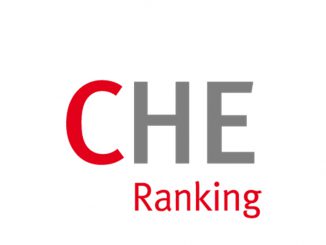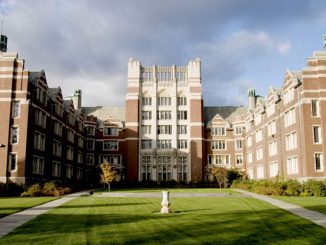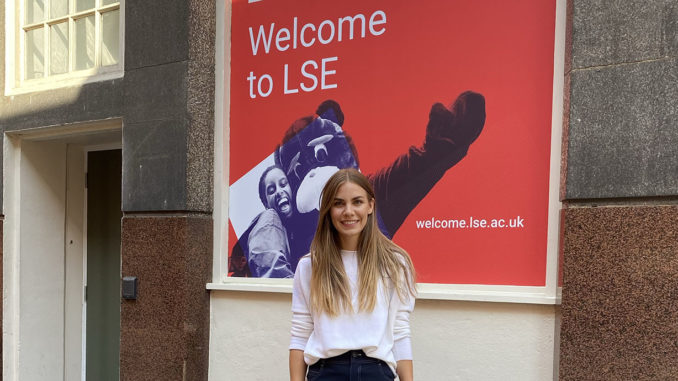
Even during school, Linda Brosig dreamt of studying at the London School of Economics (LSE). Last year, the MBS alumna was able to fulfil her dream: In September 2020, Linda started her master’s degree at the world-renowned university. In the interview, she talks about why she chose the bachelor’s program at MBS, gives insights into how she structured her studies and reveals how the master’s application at LSE worked out.
MBS Insights: The London School of Economics has always been your favorite university. Why was that the case?
Linda Brosig: When I was 14, I decided to move to a school in Somerset, England, and I completed my GCSEs and A-Levels there. One of my A-level subjects was Economics – and it was my absolute favourite! LSE is known for its expertise in economics and is one of the top universities in the world for it – after all, a quarter of all Nobel Prizes in Economics have been awarded to people who are affiliated with the LSE. Therefore, I was interested in the university quite early on and I even had the opportunity to visit the LSE campus while I was still at school – it’s right in the heart of London and I was really impressed by it. London is a such a beautiful city anyway, very international and diverse.
MBS Insights: Nevertheless, you decided to study at MBS. What attracted you to the Munich Business School?
Linda Brosig: Despite having offers from several British universities, I decided to come back to Germany. I was particularly attracted to MBS because of its international environment and the fact that I could do my studies completely in English – after four years of attending school in England, that was much easier for me than studying in German. It was also important to me to pursue a practice-oriented business degree covering a broad spectrum of business areas. MBS definitively stands out because of the many soft skill courses and networking events that are offered, which is often not the case at larger universities. MBS also provides many opportunities for presentations, group work and leadership roles. I found that especially helpful to improve my confidence and to become more comfortable when speaking in front of larger audiences. This has turned out to be one of the most valuable things for me and was also extremely useful in my internships between bachelor’s and master’s studies.
MBS Insights: What were the highlights of your studies at MBS and which study concentrations did you choose?

Linda Brosig: For my concentrations, I chose Financial Management with Professor Dr. Eva Stumpfegger and Corporate Governance with Professor Dr. Carsten Rennhak. Both subjects interested me very much and I also liked the teaching style of both professors, which I knew from previous courses. For the international focus, I chose Spanish because I already had Spanish as an A-level and I wanted to continue learning the language. Another highlight during my bachelor’s degree was definitely the courses taught by Professor Dr. Harald Müllich and his approach of not only looking at the topics through a business lens but also from a political and social perspective. His subjects were certainly very demanding, but in the end, they were a lot of fun and you definitively gained a lot of general knowledge. Another highlight was my semester abroad, which I spent at Seoul National University in South Korea. SNU is one of the top universities in Korea. My internship abroad, which I also completed in Seoul, gave me an even better impression of the country and people. It was an amazing six months!
MBS Insights: Can you tell us about the topic of your bachelor’s thesis?
Linda Brosig: The topic of my bachelor’s thesis was “The Impact of Top Management Team Diversity on Firm Performance”. I conducted interviews with seven C-level executives from different companies and asked them how they perceived diversity to affect the performance of their companies. I chose a qualitatively approach to explore my results and came up with some very exciting findings. The conclusion of my analysis was that diversity in management leads to more innovation, ideas and creativity. In addition, it became clear that different perspectives in top management teams can help to achieve better organisational results.
MBS Insights: Despite your time here in Munich and at MBS, the London School of Economics (LSE) always remained your goal and in the winter semester 2020, you started your master’s degree there. Did you work towards this goal in a special way or were there, in your opinion, special factors that led to success in the application process?
Linda Brosig: I already knew during my time at MBS that I wanted to do another master’s degree and the LSE was still at the top of my personal ranking. In addition, I very much wanted to go back to England in order to live in London. When I looked at the degree programs offered by the LSE, I found a program called “Management of Information Systems and Digital Innovation”, which is also what I am now studying. The degree sounded very exciting as it is very future-oriented and has a specialised focus on the management of new technologies and innovation. It also complemented the internships that I did during the gap year between my bachelor’s and master’s degree: First, I worked at KPMG in finance advisory, in the digital transformation and process excellence solution, which also focuses on digitalisation in the accounting and finance department. Second, I interned at Accenture Strategy, a consultancy that is also known for its technology expertise.
I think the most important thing for a successful master’s application is to convincingly elaborate your motivation and to highlight how a postgraduate program will help you advance your career. For example, through my experiences at MBS and relevant internships, I was able to demonstrate my interest in the program at LSE. I am sure my undergraduate degree and the positive letters of reference from my professors also contributed to being accepted. But in the end, I believe that grades are not the most important thing and that it is mainly various experiences and enthusiasm for the course what counts. It is important to tailor your motivation letter specifically to your chosen program, to convey your motivation convincingly and to back it up with relevant experience – whether it’s through courses, internships, readings or research activities. If you do this, you have a good chance of being accepted at the world’s top universities.
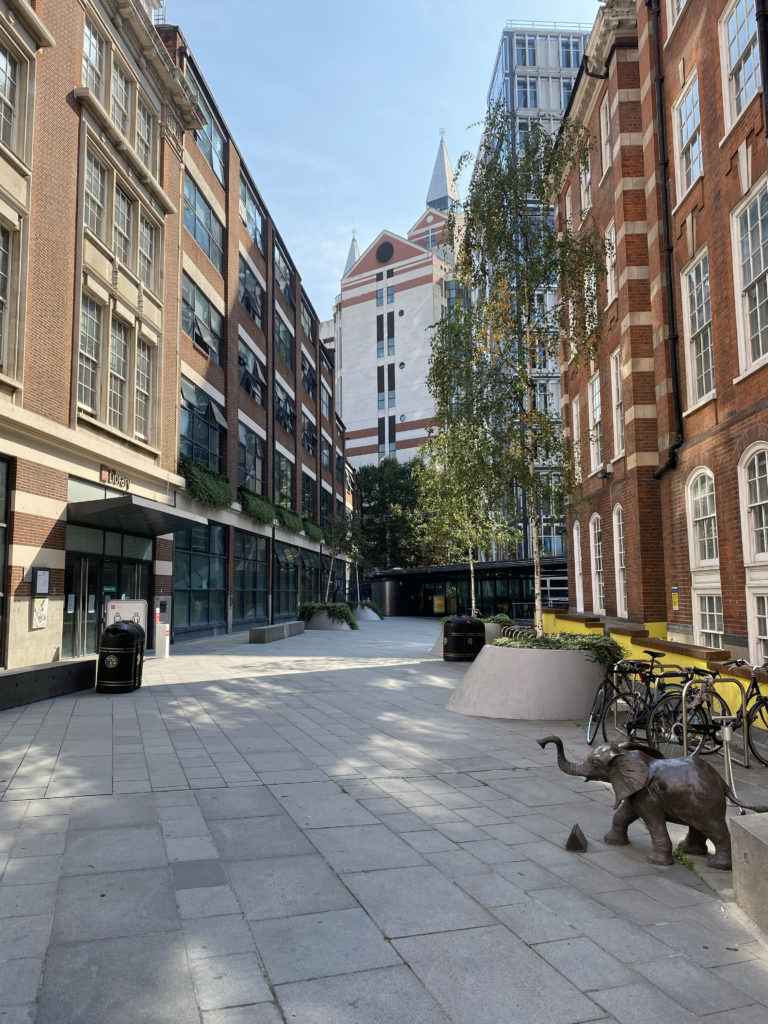
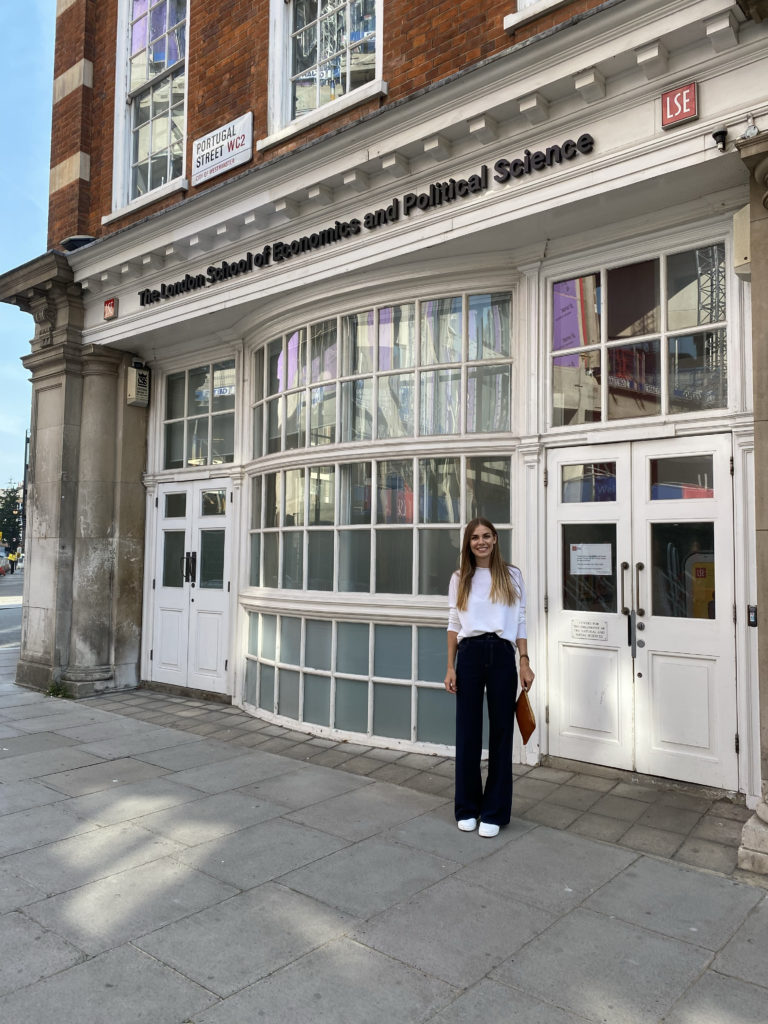
MBS Insights: How was your first semester at LSE? What are your experiences so far?
Linda Brosig: My first semester at LSE was a lot of fun and I was able to gain a lot of new experiences – even though due to Covid-19 not everything turned out as expected. However, LSE handled the situation very well: we had a mix of in-person classes on campus and online lectures, and in general LSE has provided a lot of support. The academic standards at LSE are very high and it was very exciting to be taught by professors who are leaders in their academic fields and regularly publish their own studies. An absolute highlight was the “Sprint Week”: this was a one-week consulting project in cooperation with Roland Berger and Visa where we had to develop a digital solution around the topic of fraud prevention. It has also been exciting to learn from my fellow classmates: due to the many nationalities, the diverse academic and professional backgrounds and especially because everyone has a passion for different topics, it is never boring outside of lectures and group work.
MBS Insights: Last but not least: Do you have any tips for current students on how they can structure their studies at MBS in the best possible way or how they can achieve goals that seem unattainable at first glance?
Linda Brosig: My advice for the time at MBS is to stay cool, even if sometimes it seems like a lot has to be done at the same time. You should try to take advantage of as many opportunities as possible and make the most of your time at MBS. Especially regarding fellow students, lecturers or professionals who come to MBS for events – you have the chance to meet many interesting people who may have a lasting influence on your personal career. This should not be underestimated – networking is just as important as studying!
There is one thing that I can definitely recommend for master’s applications: Apply early! The earlier you apply, the higher your chances of getting in, as there are still more places available in the program.
MBS Insights: Thank you for the interview!

You are interested in business, want to pursue an international career and get to know the world?
The Bachelor’s program in International Business at Munich Business School is the perfect preparation for this challenge! The program offers you practice-oriented teaching, an integrated semester abroad, as well as different concentrations that can be freely selected according to your interests. See for yourself: Bachelor International Business

